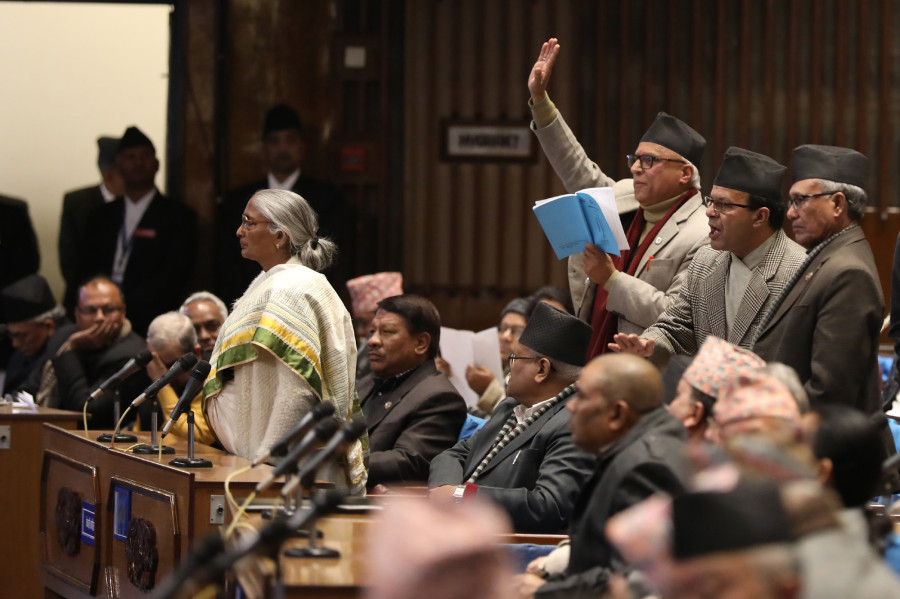Politics
A weak opposition is only emboldening the ruling party
The Nepali Congress never recovered from its 2017 electoral loss and, analysts say, amid infighting, it has largely failed to act as a proper check on the ruling party.
Tika R Pradhan
Never in its history has the Nepali Congress been in such a shambles as it is today.
With the ruling Nepal Communist Party government readying to push through a number of controversial laws that could have far-reaching implications on democratic space, the Congress party, as the primary opposition, has been unable to mount a proper challenge. It is a struggle within, fighting factional feuds.
Congress leaders readily admit that they have failed to play the role of an effective opposition, but they don’t appear to have a plan to put their house in order.
“At a time when we should have been focusing on holding the government to account, we are busy infighting,” said Minendra Rijal, a central working committee member and lawmaker.
Factional feuds in the Congress are not new. The party even split once, after Sher Bahadur Deuba in 2002 decided to form his own Nepali Congress (Democratic) after differences with then party president Girija Prasad Koirala. Deuba had been hailed by a section of party leaders for standing up to what they called Koirala’s “highhandedness”.
Today, Deuba, as party president, is facing the same criticism—for bulldozing decisions on his own, and ignoring internal dissent and the dissatisfaction of other factions, particularly those led by Ram Chandra Poudel and Krishna Prasad Sitaula.
Prakash Saran Mahat, joint general secretary, admits that the party should have stood united at this time.
“But some leaders are taking up unnecessary issues against the party president. The ongoing differences in the party are being blown out of proportion,” Mahat told the Post. “It’s unfortunate.”
Political analysts say that the Nepali Congress was caught unawares when it faced a spectacular defeat in the 2017 elections and it hasn’t been able to recover. Fighting an alliance of the two communist forces, running on a platform of nationalism and stability for prosperity, the Congress party went to the polls with no real agenda of their own except for warning against the authoritarianism.
People voted the communists to power, throwing the Congress party, with just 63 seats, to the other side of the aisle in Parliament.
Rajendra Maharjan, a political commentator and columnist for Kantipur daily, the Post’s sister paper, said the Nepali Congress has never been in opposition for so long in the country’s democratic history.
“Its leaders lack experience when it comes to playing the role of an opposition, but the party as a whole lacks a clear agenda and vision,” Maharjan told the Post. “And the ongoing infighting is making things worse for the party.”
While the Congress prides itself as the champion of democracy, internal democracy in the party has been on the wane.
“Dissenting voices within the party are being stifled. The leadership is imposing decisions and amending the party statute on whims,” said Rijal. “As the primary opposition, it’s our duty to question the government’s decisions but when we fail to call out wrongdoings in the party, the people will doubt our moral ground.”
After demands from the dissenting factions, the leadership has announced the party’s 14th general convention for February 19-22, 2021 employing a provision in the Congress charter that allows an extension of the party committees’ term for a year.
“But the establishment side took the decision on a majority basis, which is unprecedented in the party’s history,” said Rijal. “Deuba even amended the party statute, allowing him to award active membership to anyone who is eligible to vote in the national convention. This can really swing the results.”
The party’s 13th general convention was held on March 3-6, 2016, and the Congress should have held the 14th convention by March. But citing an extraordinary situation, a central committee meeting held on December 27, where the factions led by Poudel and Sitaula were not present, decided to extend the party committees’ term by a year as per clause 43 of the party statute.
The failure to hold the general convention, which needs to be held every four years, shows how the party organisation is in a shambles, analysts say.
“The party has become even weaker due to internal conflict,” said Geja Sharma Wagle, who extensively writes on current political affairs. “Even just to save face, the Congress party should have kept its internal conflicts aside and tried to stand up as a strong opposition.”
The party’s failure to act as an effective opposition poses a larger danger, say analysts, as parliamentary democracy flourishes when the opposition constantly helps to maintain checks and balances.
“The ruling party does not feel any threat from the main opposition,” said Wagle. “The infighting in the opposition party has emboldened the ruling communist party, which is becoming more and more autocratic.”




 8.67°C Kathmandu
8.67°C Kathmandu














